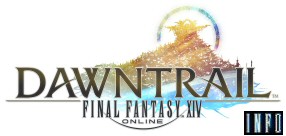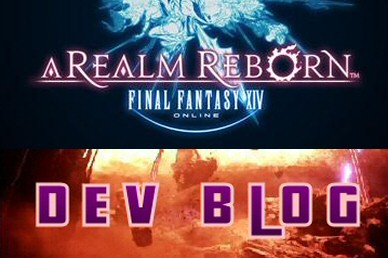Hello everyone, this is Miyamiya from the Promotional team!
FFXIV Backstage Investigators is a blog series that share behind-the-scenes stories from the team members who work on all aspects of FFXIV.

The subject of our seventh interview is…
Lead Technical Artist Tatsuya Okahisa!
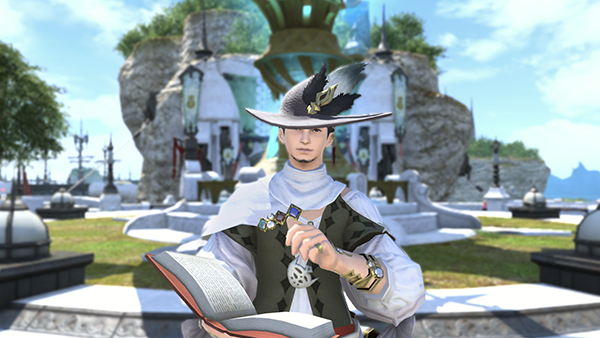
▲ A screenshot from Mr. Okahisa of a look-alike based on his personal character.
Since I knew next to nothing about technical artists, my investigation began from learning what they do!
******
Miyamiya: In general, technical artists seem like the intermediary between artists* and engineers, who also create tools for artists to use. What does your team do when it comes to FFXIV?
* In this article, we use the term “artists” to collectively refer to the teams that handle 3D modeling, animation, effects, cutscenes, and other design data.
Okahisa: In FFXIV, the primary job of a technical artist is to support and improve the production process for artists. We create tools and put features in place to help them mass-produce high-quality assets.
As an example, there are currently eight playable races in FFXIV, or fifteen variations of playable characters when you count male and female separately and include male Viera. When we create a piece of equipment, we have to create a different variation for each type of playable character. That’s where technical artists come in.
Our team created a tool to automatically modify equipment to match each race and successfully automated the basic parts of the process that are always handled the same way. The tool was implemented around 2013, and we’ve continued to work on it as features change or new races are added.
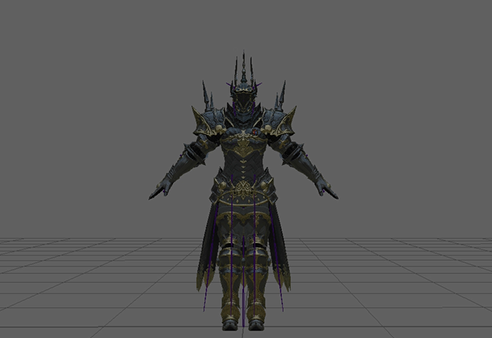
↓ Press a button and wait a few tens of seconds…

▲ The tool automatically modified the equipment from male Hyur to male Roegadyn.
From here, the artists put on the finishing touches to turn it into the final quality we see in-game.
We help artists by taking mechanical tasks like that and simplifying them as much as possible. As we work on those sorts of tasks, we learn more about how the art data is designed, and that knowledge helps us to come up with new in-game features or provide support when something in the game doesn’t look the way it was intended.
We may not seem all that different from programmers; however, in addition to our broad knowledge of programming, we also have insight on how the artists create their data and the inner mechanisms of development tools, which I believe to be our specialty.
Miyamiya: That tool is almost magical!
It sounds like the assistance provided by your team is instrumental in creating the wide variety of playable races and equipment we all enjoy.
How did you become a technical artist?
Okahisa: I was a new graduate when I joined Square Enix as a technical artist.
I had originally studied for the computer graphics and film industry, and as a student I interned at a company specializing in live action. Since it was for live action, the things that we made were all visually stunning, but the actual work was continually dull and tedious. When I began improving our workflow, I found it to be fascinating, and upon looking into it some more, I learned about technical artists and began aspiring to become one.
At the time, technical artists were still a new career field and very few companies were looking to hire them. Under such circumstances, I found a recruitment listing for newly graduated technical artists by the department which eventually would become Square Enix’s Creative Business Unit III.
Although I wasn’t particular about working in the game industry, the job description sounded like I could do what I had wanted to do, so I applied and was hired for the job. I was assigned to the FFXIV team right before the release of A Realm Reborn, and I remember being taken aback by the hectic atmosphere of the workplace. (laughs)
Miyamiya: What incredible timing to join the company!
Of all the things you’ve worked on since joining in A Realm Reborn, is there anything that stood out to you as particularly memorable?
Okahisa: In terms of something players would be familiar with, adding underwater actions in Stormblood was particularly memorable for me.

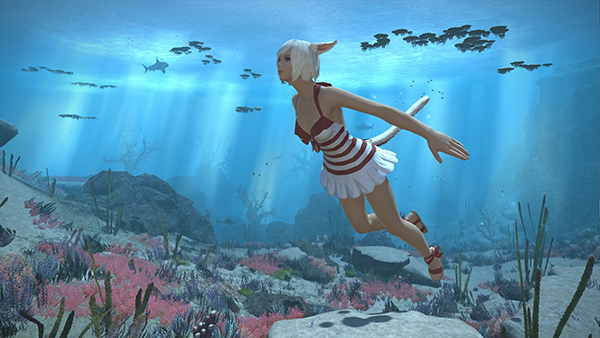
▲ The FFXIV experience was further expanded with the addition of flying in Heavensward and swimming/diving in Stormblood.
During the process of adding underwater actions, I handled designing schemes for artists.
For example, some of my suggestions to the programming and artist teams included a scheme for synchronizing the swimming animation with the splashing water effect, and how the diving and swimming animations might be best blended together.
The hardest part of that process was adjusting the characters’ point of reference above water.
Characters in FFXIV have something called a “point of reference,” which allow us to use the same animations across characters with different physiques.
When the characters are standing on the ground, their feet are the point of reference.
In the water, however, the distance from the characters’ feet to the surface of the water caused Lalafell to look like they were sinking, while Roegadyn appeared to be floating a bit higher than they should.
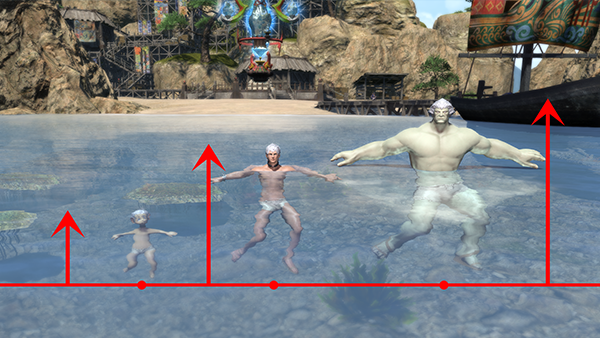
▲ As you can see, when the characters’ feet are the point of reference, the Lalafell and Roegadyn’s bodies are uneven with the water’s surface.
To resolve this, I had to ask a huge favor of the programmers to make a procedure which quickly changes the characters’ point of reference to their chest as soon as they enter the water.
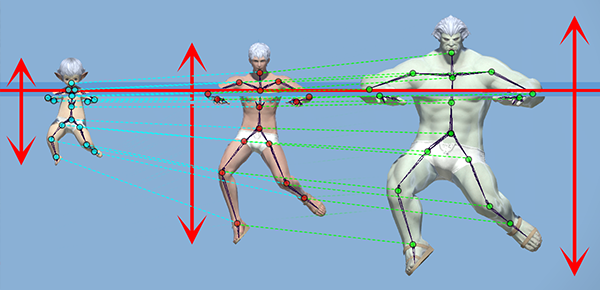
Miyamiya: It’s enlightening to learn about these backend procedures for new features! Do you have any mottos when working on these kinds of things?
Okahisa: I actually have several.
“Design things that can be maintained over time.”
“Don’t use a feature outside of its intended scope.”
“Avoid conflicting implementations.”
Those are just some of the ideas that I try to keep in mind.
Because FFXIV is an online game with periodic updates, you can’t just create something then forget about it once it’s complete. Designing an intricate feature means spending more development cost on adjustments when it’s affected by a later update, which could make us miss a deadline. In situations when we could technically make a feature more intricate if we tried, it’s important to draw a line based on the fact that it needs to be maintained moving forward.
Another thing is how we have no idea what sort of updates there may be in the future, so I believe making predictions and implementing things ahead of time is unrealistic. Instead, I try to make implementations that don’t conflict with anything else at that moment in time.
An example from FFXIV would be when we designed the blowgun mini-game.
We needed to know when the player hit the enemy character in the head, and for this we could’ve used the target that was already placed in its head, which we’ll call Target A. However, Target A was not something that was specifically designed for the blowgun mini-game. The reason why I avoided reusing Target A was because enemies with multiple heads (like Cerberus) or no head (like Ozma) don’t have a Target A assigned to them. If we ever decided to use enemies like that in a future version of the blowgun mini-game, we might run into some issues. In the end, to meet the needs of the mini-game, we created a Target B that could be freely altered in size and position.
These kinds of conflicts usually aren’t obvious during implementation, and we often only realize there’s a problem when we try to expand upon an existing system. So when we implement new things, I try to make sure that we aren’t using features and tools in ways they weren’t intended for.
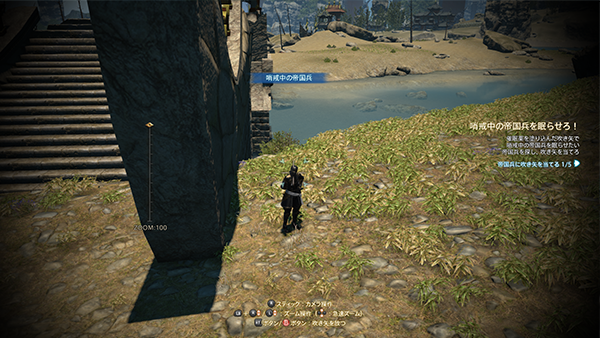
▲ The blowgun mini-game first appeared in the Stormblood main scenario and involved shooting Garlean soldiers.
Other than that, I try to create controlled environments where errors are unlikely to occur, design features that can be easily relearned even if you forget.
Miyamiya: Seeing as you handle these underlying components, I can understand why you have so many mottos to keep yourself aware. Under such circumstances, is there anything about FFXIV that stands out to you as a technical artist?
Okahisa: Online games are developed and operated over a long period of time, and that requires us to handle a colossal amount of data. While that can be a daunting task, it can also be appealing for someone like me who finds it fulfilling to optimize workflow and eliminate errors.
Additionally, our long-term operations make it easy for us to plan new things we want to do, which is also part of the appeal.
Miyamiya: Based on how you consider the hard parts of the job to be part of the appeal, I can tell you have a challenging spirit towards what you do.
Next, I’d like to ask our usual question about your tools of the trade! Is there anything you simply can’t work without, carry everywhere with you, or find useful?
Okahisa: That would be the text editing program, Hidemaru Editor.
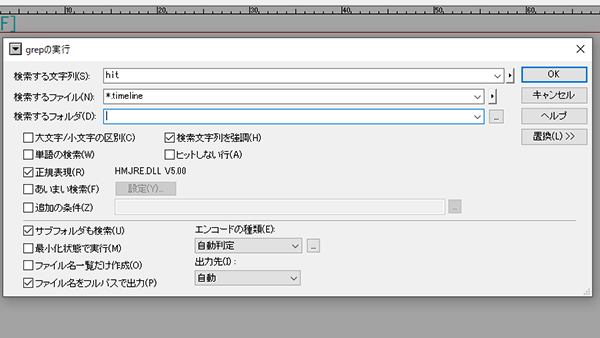
When coming up with new features, I use a lot of different programs to research my previous projects; however, Hidemaru is the one I use the most frequently. One of the things I like about it is the grep command, although it’s not unique to Hidemaru.
In FFXIV, there’s a colossal amount of animation and character data, and when we’re adding a new feature, we have to make sure it won’t conflict with any existing data. If there’s anything that will be affected, we have to make adjustments, which means we have to find all the data files that would be affected.
By using the grep command, I can enter a particular pattern of characters, and it’ll instantly search through certain file types or folders to find all the instances where that pattern appears. Checking every single file myself would be a never-ending task, so it’s extremely helpful for me as a technical artist. (laughs)
Miyamiya: Sounds like it’s an absolute necessity for you and your team, since you handle a colossal amount of data files!
Finally, do you have any parting words for our readers?
Okahisa: Thank you for playing FFXIV.
Seeing your comments on videos and social media are a huge source of motivation and an enjoyable part of my daily life. The development team is finishing up the upcoming Endwalker expansion, so I hope you’ll wait for us just a while longer.
As for our team of technical artists, we’ll continue giving it our all to deliver new experiences and high-quality assets to you, so thank you for your continued support!
******
How did you enjoy our interview with Lead Technical Artist Tatsuya Okahisa?
Thanks to the support provided by him and many others, we are able to enjoy a wide variety of things in the world of FFXIV in a seamless and natural manner!
See you next time!
Previous Editions of FFXIV Backstage Investigators
・ (No. 1): Main Scenario Writer Banri Oda
・ (No. 2): Lead Level Designer Arata Takahashi
・ (No. 3): Web Director Hiroyuki Takachi
・ (No. 4): Lead UI Artist Yoichi Seki
・ (No. 5): Character Concept Artist Hiroyuki Nagamine
・ (No. 6): Community Planner Takeshi Kato
Miyamiya
– Promotional team
